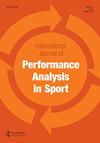运动员训练与成绩的脉冲反应模型的贝叶斯推断
IF 1.6
4区 教育学
Q2 SPORT SCIENCES
International Journal of Performance Analysis in Sport
Pub Date : 2023-10-12
DOI:10.1080/24748668.2023.2268480
引用次数: 1
摘要
摘要利用Banister脉冲响应模型预测运动员的运动能力。尽管历史悠久,但由于难以获得精确的参数估计和性能预测,该模型的实用性仍然有限。为了帮助解决这些挑战,我们开发了IR模型的贝叶斯实现,该模型形式化了先验知识和数据的组合使用。我们报告了以下方法学贡献:1)我们重新制定了模型以促进信息先验的规范,2)我们用贝叶斯术语推导了IR模型,3)我们开发了一种方法,使JAGS软件能够在执行参数约束的同时使用。为了证明其原理,我们将该模型应用于国家级中长跑运动员的数据。我们从已公布的IR模型参数值中指定先验,然后从先验和运动员数据中估计后验分布。贝叶斯方法比非线性最小二乘法的参数估计更精确、更可信。我们的结论是,IR模型的贝叶斯实现在解决其对运动员监测有用性的主要挑战方面显示出希望。作者感谢加拿大太平洋体育学院和维多利亚大学的Marc D. Klimstra博士的支持和指导。披露声明作者未报告潜在的利益冲突。本研究由Own The Podium-Mitacs加速奖学金资助RTB和DCC,并由加拿大统计科学研究所体育分析合作研究小组资助。TBS和DCC由加拿大自然科学与工程研究委员会资助。本文章由计算机程序翻译,如有差异,请以英文原文为准。
Bayesian inference of the impulse-response model of athlete training and performance
ABSTRACTThe Banister impulse-response (IR) model was designed to predict an athlete’s performance ability from their past training. Despite its long history, the model’s usefulness remains limited due to difficulties in obtaining precise parameter estimates and performance predictions. To help address these challenges, we developed a Bayesian implementation of the IR model, which formalises the combined use of prior knowledge and data. We report the following methodological contributions: 1) we reformulated the model to facilitate the specification of informative priors, 2) we derived the IR model in Bayesian terms, and 3) we developed a method that enabled the JAGS software to be used while enforcing parameter constraints. To demonstrate proof-of-principle, we applied the model to the data of a national-class middle-distance runner. We specified the priors from published values of IR model parameters, followed by estimating the posterior distributions from the priors and the athlete’s data. The Bayesian approach led to more precise and plausible parameter estimates than nonlinear least squares. We conclude that the Bayesian implementation of the IR model shows promise in addressing a primary challenge to its usefulness for athlete monitoring.KEYWORDS: Athletic performancemathematical modellingBayes theoremcomputer simulation AcknowledgementsThe authors thank Dr. Marc D. Klimstra of the Canadian Sport Institute Pacific and University of Victoria for his support and guidance.Disclosure statementNo potential conflict of interest was reported by the author(s).Additional informationFundingThis study was funded by an Own The Podium-Mitacs Accelerate Fellowship to RTB and DCC and by a Canadian Statistical Sciences Institute Collaborative Research Team grant in sports analytics. TBS and DCC are supported by grants from the Natural Sciences and Engineering Research Council of Canada.
求助全文
通过发布文献求助,成功后即可免费获取论文全文。
去求助
来源期刊

International Journal of Performance Analysis in Sport
Health Professions-Physical Therapy, Sports Therapy and Rehabilitation
CiteScore
4.40
自引率
4.80%
发文量
38
期刊介绍:
The International Journal of Performance Analysis in Sport aims to present current original research into sports performance. In so doing, the journal contributes to our general knowledge of sports performance making findings available to a wide audience of academics and practitioners.
 求助内容:
求助内容: 应助结果提醒方式:
应助结果提醒方式:


